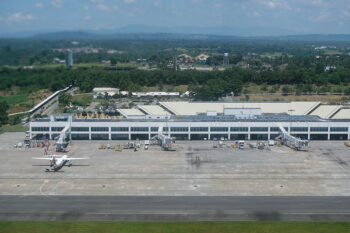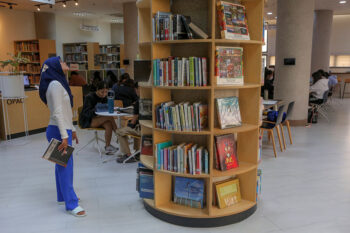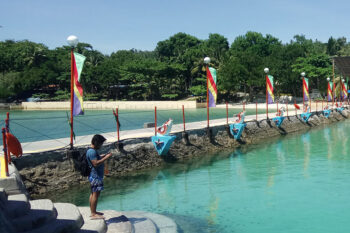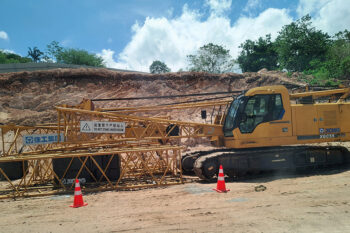QUEZON CITY (MindaNews / 08 July) — Today’s eidu l-fitr is a blessed day (eidun mubarak). It is a day in expressing thanks and gratitude to Allah (SWT). It is a day in declaring salam (peace) and salawat (blessing) to our Noble Prophet, Nabi Muhammad (SAW). It is also a day of forgiveness. It is a day of victory. It is a day in forging even much stronger ties with our family, our love ones, and friends. It is a day in strengthening our brotherhood with the rest of the ummah and other peoples.
More importantly, today is the culmination or fulfillment of all values with what Prophet Muhammad (SAW) speaks about the month of Ramadan constituting the bestowal of mercy (rahmah), forgiveness (maghfirah), and for the saim made away from the Hell-Fire or ithqun mina n-nar.
Alhamdulillah, all these rare blessings in this challenging time are vested to all those who have successfully performed their fast in the just concluded Holy Month of Ramadan.
Questioning
Undeniably, as we rejoice the blessings of eidu l-fitr today, truth is, we are not able to fully relish it. Today, we are also in deep questioning why the increasing crime, violence, and corruption and all other form of inequities in our society and the world at large. There seems to be no society spared from such inequity these days.
The Holy Qur’an refers to such inequity invariably as bala, fasad, fitnah and few other terms. More pertinent is that such inequity is happening not only in the Philippines; it is terribly alarming, with much graver degree, in many Muslim countries like Syria, Iraq, Turkey, Cameroon, Bangladesh, and just recently, Saudi Arabia. These are just few countries plagued with violence as of late. If we include more countries and trace back farther in our counting, we will practically be at loss how to inventory such violence with their increasing barbarity and lethality while becoming more indiscriminating to mostly civilian victims.
Hence, we cannot help but ask: Do we now live in an extremely dangerous time? Have we already reached the worst fitnah of akhiru z-zaman? How can we be protected from such fitnah?
As fitnah or trial of akhiru z-zaman or the latter days goes unabated with its ever-increasing intensity, yet, we are still able to perform our fasting in the Holy Month of Ramadan relatively free and unaffected by the gravity of fitnah in other countries and communities. Is this not even more reason for us to be thankful and grateful to Allah (SWT)?
Apart from the bestowal of mercy and forgiveness, we must equally take to heart the bestowal known as ithqun mina n-nar – those believers, because of their fasting, are being made away from the Hell-fire. The value of this Prophetic tradition or hadith is immense.
Nār and fitnah
For clarity, the notion of nar or Hell-Fire is not simply that Eternal Abode in the Day of Judgment. Nar is related to fitnah or anything that is imposed on the sons of Adam (AS) – that means all men and women, you and me – who could potentially succumb to trials and tribulation that operate in various facets of our lives, in our society, and the world at large.
As fitnah is becoming widespread with increasing intensity, certainly, we cannot face them alone. Hence, there is a du’a or supplication that we must frequently pray or utter to protect us from worldly nar and fitnah. It reads:
“We beseech Allah to protect us from the Hell-Fire.
We beseech Allah to protect us from all kinds of Hell-Fire.
We beseech Allah to protect us from diniyyah and dunyawiyyah.
We beseech Allah to protect us from the fitnah of the latter days.
We beseech Allah to protect us from the fitnah of Masihi d-djjal wa s-sufyan
We beseech Allah to protect us from dalalah, bid’iyah and baliyyah
We beseech Allah to protect us from commanding soul
We beseech Allah to protect us from the commanding souls of fir’auniyyah (or power).”
Please note this prayer speaks about the beseeching of Allah’s protection from all kinds of nar and fitnah. This relates particularly to the third bestowal for those who have fasted in the Holy Month of Ramadan, as they are vested with ithqun mina n-nar. It means the importance of fasting in the Holy Month of Ramadan is captured in the whole intent of said du’a. What we pray with the above du’a is actually answered with our fast in the Month of Ramadan. We are being made away from the fitnah of nar including, by extension, the fitnah that grips the world these days.
As we cannot outline the details and significance of this point, let us just highlight at least three types of fitnah. One, fitnah of akhiru z-zaman; two, fitnah of the self; three, fitnah of our love ones like our children and our properties.
The first is related to the trials of latter day history. It is related traditionally to some eschatological views about the coming of Nabi Allah Isa or Jesus (AS) as ilmun li s-sa’ah, the Sign of the Coming of the Hour. It is also related to some manifestations of the akhiru z-zaman like the competition amongst Arabs in building high rise buildings, the rise of Black Flag bearers, and so on. There are many ahadith reflective of this type of fitnah. The pertinent du’a is: “allahumma ajir min fitnati l-akhiri z-zaman.”
But the question is not so much about when is the akhiru z-zaman or when is the coming of Nabi Allah Isa (AS) or the appearance Dajjal and so on. What is important is the view that it is as if time or the flow of history – past, present, and future – comes with fitnah or test and tribulation. It is such that it is in our time this fitnah is becoming overwhelming. Thus, in Suratu l-asr, we read:
“By (the token of) time (through the Ages),
Verily man is in loss,
Except such as have Faith,
And do righteous deeds,
And (join together)
In the mutual teaching
Of Truth, and of Patience and Constancy (103: 1-3).”
No less than Allah (SWT) who makes an oath about time. It is not meant an ordinary or simple meaning of time. But it is time “through the ages.” Existentially, it is a time since Adam (AS) until our time including the time yet to come.
Of all modern commentators, Yusuf Ali is very much aware about the wide latitude of what is meant by asr (time “through the ages”) fraught with fitnah or trials with unique reverberations these days.
The other form of fitnah is a trial of the self. Thus, that prayer says: allahumma ajirna min sari n-nafsi l-ammarah. We beseech Allah (SWT) to protect us from nafsu l-ammarah or commanding spirit. It is a spirit that is within us as individuals. The Qur’an says:
“Every soul shall have a taste of death:
And We test you by evil and by good by way of trial.
To us must ye return. (Anbiyah 21:35).”
There is also another form of fitnah apart from the self. It is a fitnah associated with our love ones including our sons and daughters, our family, our properties, and so on and so forth. The Qur’an says:
“And know ye that your possessions
And your progeny
Are but a trial; and that it is Allah
With whom lies your highest reward.”
(Anfal 8: 28; same in Tagabun 64: 15)
These are the three types of fitnah or trials dominant in our time.
Spirituality of the muqarrab
Knowing that today’s fitnah is becoming too immense even fearsome, how fortunate those successful saim, those who faithfully fast, to be armed with a rare weapon to avoid or ward off fitnah and maximize their time in the fulfillment of Allah’s command during the Holy Month of Ramadan. They know that the virtue and bestowal of spirituality vested to believers on such a blessed month is multifold.
The sahabah or close companions of the Prophet would sob in tears and cry whenever the Ramadan ends. They would repent why they have not performed more righteous deeds during Ramadan. It is relatively the same with the repentance of all men and women in the Day of Judgment. All of us as sons and daughters of Adam (AS) would repent. We all repent that day as we long to return to the world to perform more ibadah or righteous deeds. And we repent why we have not done much when we are still alive in this world.
The sahabah would weep why some of them neglected their tahajjud or night vigil prayers; why they have not read much the Holy Qur’an, and so on. For, they know that the virtue of past Ramadan would never come, as the asr of next Ramadan would already be different. They would be gripped with their emotions, as they didn’t know whether they could still be around to welcome the next Ramadan.
How fitting it is to remind us with the same attitude on Ramadan. How many of us who are fervent with our tahadjud, with reading the Qur’an, and so on? How many of us who just refrained from eating and drinking, but still involved in blameworthy and sinful endeavors? How can we be sure that we are still around to welcome the next Ramadan? Some of us may have lost loved ones and friends recently? In the past they were with us; now they are not. This is how temporal our relation with anyone. It is not meant to last.
Like any Ramadan, if our relation with it remains superficial, it would just depart unnoticeably. But if we value Ramadan like our love ones and real friends by forging real relationship as we engage in real fasting – the fasting of the muqarrab – those who forge real relationship and seek nearness to Allah (SWT), then the spirit of Ramadan remains in us even as we welcome with gladness the eidi l-fitr like today.
The spirituality of the muqarrab is underscored in the set of verses on fasting in Suratu l-baqarah. It reads:
“When My servants
Ask thee concerning Me,
I am indeed
Close (to them):
I listen to the prayer
Of every supplicant when he
Calleth on Me:
Let them also,
With a will,
Listen to My call,
And to believe in Me:
That they may walk
In the right way (Al-Baqarah 2: 186).”
It is, therefore, a rare privilege to be given the opportunity to develop spiritually during Ramadan amid the rumblings and fitnah of the world. It is even more encouraging when we are able to forge real relationship that is lasting and eternal. It is the reason why when eidu l-fitr comes successful saim welcome it with joy and happiness. They are grateful to Allah (SWT), as they pursue their experience even further.
When we are deeply concerned with increasing fitnah or trials the world is currently experiencing, we could not help but ask, as we raised them earlier, why the Muslim world is at the center of such trials.
As we could not make an inventory of problems besetting the Muslim world due to their enormity, recent vociferation smacks even more pathetically in our faces.
No less than the graveyard of Prophet Muhammad (SAW) was attempted of being destroyed including other strategic places in Saudi Arabia. This is not to mention other equally terrible vociferation with more tragic impacts in other places in the Middle East and elsewhere with the image of Islam and the Muslim world dragged arbitrarily into the picture.
There is no instance in modern history where inequity of such magnitude is displayed horribly. There was the group of the Khawarij or seceders in the early days of Islam, but they are now dwarfed if not rendered irrelevant brought about by new fitnah the Muslim world faces today. And we are at loss how to explain it.
Beyond traditional prism
In several instances, we had attempted very humbly to trace it beyond the prism of politics and history and other logical positivist lenses. We traced the phenomenon into their roots using meta-history and Islamic thought. Essentially, we pointed into the fragility of human nature brought about with what Nabi Allah Adam (AS) had experienced when he succumbed to the shajaratu l-khuld wa l-mulk the “tree of eternity and power.”
As we had explained in many of our Friday khutbah, when Nabi Muhammad (SAW) engaged in the mi’raj (Ascension) he got at certain distance with the same tree, the so-called shajaratu l-ma’lunah or Accursed Tree. But the difference is that whereas Nabi Adam (AS) succumbed as he directly saw the tree, Nabi Muhammad (SAW) did not see the tree because it was covered. It suggests that Nabi Muhammad (SAW) and his progeny and followers have distinct kind of protection from fitnah different from other sons of Adam (AS). This we traced, in the higher plain, the difference and similarity of fitnah in the Muslim ummah and the rest of mankind.
Yet, it does not end the question. The fitnah in the Muslim world today is, in some sense, severe than the trials of the rest of mankind. Thus, it destroys our thesis of so-called distinct protection; that is – if indeed the Muslim ummah is eschatologically protected why have they seemingly succumbed to the fitnah of akhiru z-zaman?
Again, we said we are at loss of explanation, although there are men of insights who also tried to probe into the nature and ills of akhiru z-zaman or latter day history. We could, at least, partly agree with the thought of Martin Lings also known as Shaykh Abu Bakr Sijaruddin in his piece, “The Signs of the Times.” He wrote:
“All religions agree that we are through the final phase of one of the great cosmic cycles. The end of a cycle means that the possibilities that were contained within it from the beginning have reached the extremity of development – that is the extremity of separation from the Principle.”
By the way, Martin Lings is a famous British scholar who embraced Islam in latter part or mid part of his life. He tried to probe this question. He identified what he refers to as “Uncreated Eternal Principle,” that is – the source, if we may say, of the balance in creation. This is also what the Qur’an speaks about qist and mizan and other pertinent concepts and principles about unity, harmony, and balance in creation.
According to Martin Lings this balance has already been tilted as the two forces that maintain it – the force of ascent and the force of descent – have been rendered lopsided with the latter overwhelmingly destroying or defying the Principle since the Fall (or more appropriately the slip from Paradise) of Adam (AS) and on and on with the continuing degeneration of asr in modern time. Dr. Lings wrote further:
“Such a period is one of remoteness from God. And one of its necessary characteristics is a world largely peopled of men and women who have no conception of man’s true nature and responsibility. He is, for them, not the representative of God on earth but merely the summit of the animal kingdom.”
It is a very general view by Shaykh Abu Bakr Sijaruddin regarding akhiru z-zaman, why there is an increasing fitnah in our time. We said we partly agree with Dr. Martin Lings. (We will qualify more on this point in our future khutbah).
But if we may add and take a slice in the wide range of answers the question we raised why the Muslim world is at the center of fitnah, we say, at least one of many answers, that even if they are eschatologically protected as ummah of Prophet Muhammad (SAW), there is still a need for them to undergo a filter, some kind of distillation so they can be identified with their darajat or level or grade.
In other words, even if the Mulim ummah has distinct position, she has to experience trials and tribulation so that each and every man and woman of Islam finds his or her reality according to each own darajat of existence and station of faith. That is why if we read the Qur’an we will find terms like Muslim, Mu’min, Muhsin, Muqarrabun, and so on and so forth. All this means variation and differentiation suggesting that as sons of Adam (AS), Muslims are not all the same. Each individual varies according to multitude of levels in the hierarchy of unity, existence, and spirituality. As we realize this reality, we need to work for more righteousness obviously. The Qur’an says that Allah (SWT) is the rafiu d-darajah, the Raiser of ranks.
Yet, it does not mean that we accept fatalistically or passively the ills of the ummah since by sheer positive efforts and values, they can be transformed for the better. We had in many of our Friday khutbah identified many of these problems and the values we must carry, and so on. We don’t need to repeat them now.
Philippine democracy and Bangsamoro
Close to home before we forget, in the Philippines we are experiencing another kind of fitnah something that we need to have critical insight so we could distill and properly assess the ills of our society.
Philippine democracy, with all its flaws, still remains a source of envy relative to some Muslim countries. The smooth transition recently from previous administration to the Duterte government is a sign that, at least, part of Philippine democracy is still functioning.
Yet, it is not without challenge. It is currently experiencing a unique trial by itself. One, the Philippines is plagued with all kinds of criminality, gambling, and corruption in practically all layers of government and society necessitating the rise of strong leadership to stop them. Second, there is resuscitation on the call for national unity with the new administration making peace with Communists and Muslim secessionists, although we don’t know how far such vision could go given the antipathy created between conservative forces and the new administration even before it took the helm of government.
Conservative forces were active since the EDSA Revolution as they were traditionally tied to what I used to refer to as “politics of nostalgia” of so-called EDSA Revolution. It aimed for reform but failed to make strong mark on national development. Instead, it facilitated the perpetuation of Filipino elitism and political dynasties in many parts of the country. As it failed to bring about meaningful reform, development, and governance into the downtrodden and the countryside, many Filipino families succumbed to drugs, crimes, killings, and corruption and all other forms of fasad and fitnah.
With massive call for strong leader, a new dawn was in the offing after the May 2016 Election. Expectedly, the Bangsamoro question may be resuscitated after the non-passage of the Bangsamoro Basic Law few months ago. The new dawn comes with agenda like federalism and Charter change. It is not yet clear how the Bangsamoro would square into said agenda. We also do not know how enthusiastic all parties concerned including the Filipino and Moro publics to bring about unity and coherence of their views to move forward the issue of the Bangsamoro.
As Muslims in the Philippines experienced unique fitnah, there are old and new forces that are coming to play to address their plight once again. We have to be steadfast. We cannot just take anything imposed upon us hook, line, and sinker. We have been failed several times by colonial powers and past governments with their promises to the Moros broken successively and unashamedly. We need to be firm and be insightful as always, although as believers, we have to look at the brighter side of life aware of our unique position as minorities with attendant birthright of struggle for self-determination.
Finally, we are thankful and grateful that we have performed our fast in the just concluded Holy Month of Ramadan. If we have not done much last month, we pray we would still be around to welcome the next Ramadan so that we can try once again to relish the spirituality of the muqarrab and struggle to be in the category with those who are called yā ibādi “Oh My servants.”
[MindaViews is opinion section of MindaNews. A khutbah delivered during the Eidi l-fitr prayer at the Balay Kalinaw, UP Diliman, Quezon City on 06 July 2016. Julkipli Wadi is Professor of Islamic Studies, University of the Philippines].







